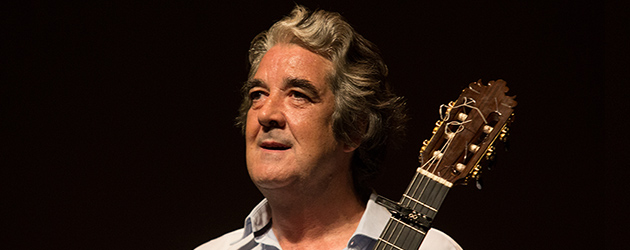Sara Arguijo
Photos&video. Rafael Manjavacas
«Parque de María Luisa» Guitar: Rafael Riqueni. Second guitar: Paco Roldán. Sax: Gautama del Campo. Piano: Chiqui Cienfuegos. Viola: Gonzalo Castelló Cello: Ivo Cortés. Violins: Jerome Ireland and José Gregorio Lovera. Bass: Roberto. Percussion and rhythm: Familia Amador. Baluarte de Pamplona. Flamenco On Fire. August 25th, 2017. Attendance: one third.
I have to admit, I got to the presentation of “Parque de María Luisa” of Rafael Riqueni at the Festival Flamenco on Fire, doubting whether the Pamplona audience could assimilate the work as we had done at the memorable concert offered by the guitarist at the Maestranza Theater. Not only because that had been the debut, and the much-awaited return of the artist to the stage, but because we thought that to feel this musical world of Riqueni’s, you had to have fought off the pigeons some Sunday, drunk from the fountain “de la niña”, gotten lost at the Monte Gurugú or fed breadcrumbs to the tiresome ducks.
The thing is, although the backdrop of the photos from our memory might change, in Pamplona, Seville, New York or Timbuktu, people share the same doubts, dreams, insecurity, discomfort, fear, joy or naiveté that marks us for life from infancy. Just what Riqueni captures with his hands.
Which is why, despite this was, unfortunately, the concert that attracted the smallest audience throughout the festival, according to official sources, from the moment the guitarist appeared on stage, the spectators filled the Baluarte with spontaneous ovations for the maestro, “he’s got silver hands!” as one per person shouted out.
Somehow, Riqueni manages to make the guitar talk, and he uses the six strings to talk about life. And he does this with absolute honesty, pouring his heart out, recognizing the fragility we all try to hide so often, to no avail. The misery, anguish and also hope, teaching us to see the beauty in things we no longer see.
In this atmosphere, he took us by the hand through the Seville park, stopping time with his hands and drawing out the sound of bells, castanets and new tones from his instrument. Particularly interesting was the intense bulerías shared with the sax of the great Gautama, and the pieces he interpreted along with the string quartet which was brilliant at all times.
After intermission, his flamenco experiences came to us in the form of tangos, rondeñas, soleá, bulerías and some beautiful fandangos de Huelva he dedicated to Niño Miguel. And I thought, what a shame the honored person had to miss that. Because with the maestro, it’s like being born again. Because his music caresses, burns, produces bruises, kisses and tickles. Because it moves us and brings us poetry. Because Riqueni is absence, the tear-drop in Becquer that proudly speaks, brings weeping and is full of questions that have no answers. What is poetry you ask; poetry is Riqueni.
Video:
